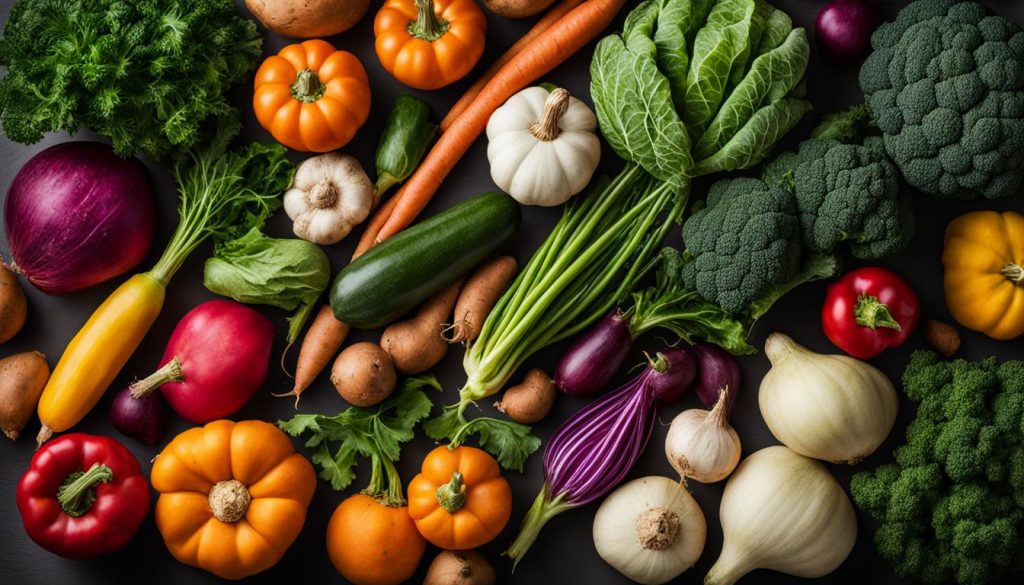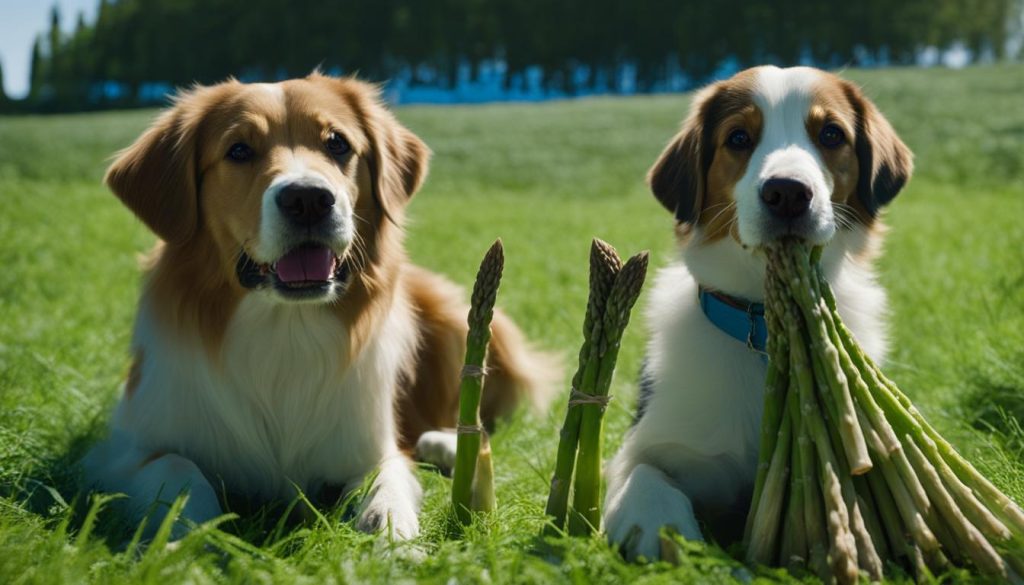As a professional copywriting journalist, I often come across questions about what dogs can and cannot eat. One common inquiry is whether dogs can eat asparagus. In this article, I will provide you with expert tips and guidelines on feeding asparagus to your furry friend.
Key Takeaways:
- Asparagus is not toxic for dogs and can be safely consumed in moderation.
- Chop asparagus into small pieces to prevent choking hazards.
- Cook asparagus lightly to aid digestion, without using butter or cooking oil.
- Avoid feeding dogs the inedible part of the plant, asparagus fern, as it is toxic.
- Consider including other vegetables in your dog’s diet that are easier to digest raw.
Is Asparagus Safe for Dogs to Eat?
As a dog owner, you may wonder if it’s safe to feed your furry friend asparagus. The good news is that, in general, asparagus is safe for dogs to eat. It’s not toxic and can be included in their diet, but there are some important considerations to keep in mind.
Raw asparagus can be tough and difficult for dogs to chew and digest. To make it more manageable for them, it’s best to chop the asparagus into small, bite-sized pieces. This will help prevent choking and make it easier for your dog to consume.
In addition, lightly cooking the asparagus can further aid in digestion. Avoid using butter or cooking oil when preparing it for your dog, as these can be harmful to them. Please be aware that the asparagus fern, which is the inedible part of the plant, is toxic for dogs and should be kept out of their reach.
| Vegetable | Choking Hazard | Raw Digestibility | Nutritional Benefits |
|---|---|---|---|
| Asparagus | Chop into small pieces to prevent choking | Difficult for some dogs to digest | Contains vitamins and minerals |
| Celery | Cut into small, manageable pieces | Easier for dogs to digest | High in fiber and vitamins |
| Carrots | Cut into bite-sized chunks | Easy for dogs to digest | Rich in vitamin A and fiber |
| Cucumbers | Cut into small, manageable pieces | Easily digested by dogs | Hydrating and low in calories |
While asparagus is safe for dogs to eat, keep in mind that it may not provide any specific benefits for them. If you’re concerned about the potential risks associated with asparagus or your dog has difficulty digesting it, there are alternative vegetables that can be included in their diet. Celery, carrots, and cucumbers are all suitable options that are easier for dogs to chew and digest raw. These vegetables offer important vitamins and nutrients that can contribute to your dog’s overall health.
Benefits of Asparagus for Dogs

Asparagus is a vegetable that is packed with vitamins and minerals, making it a healthy food for humans. However, when it comes to dogs, there are no specific benefits associated with asparagus. Dogs can safely consume asparagus, but it may be more beneficial to include other vegetables in their diet that are easier to digest raw.
If you’re looking to provide your dog with a variety of nutritional benefits, consider incorporating vegetables such as celery, carrots, or cucumbers. These vegetables are easier for dogs to digest in their raw form and can provide them with important vitamins and nutrients.
While asparagus can be a safe addition to your dog’s diet, it’s important to remember that moderation is key. Always consult with a veterinarian before making any major changes to your dog’s diet and ensure that any vegetables you offer are suitable and safe for their consumption.
Table: Nutritional Content of Asparagus
| Nutrient | Amount per 100g |
|---|---|
| Calories | 20 |
| Protein | 2.4g |
| Fat | 0.2g |
| Carbohydrates | 3.7g |
| Fiber | 2.0g |
| Vitamin A | 756 IU |
| Vitamin C | 5.6mg |
| Vitamin K | 41.6mcg |
| Potassium | 202mg |
Asparagus is generally safe for dogs to consume, but it may be more beneficial to include other vegetables in their diet that are easier to digest raw, such as celery, carrots, or cucumbers.
Feeding Asparagus to Dogs: Potential Risks

While asparagus is generally considered safe for dogs to eat, there are some risks that pet owners should be aware of. These risks primarily revolve around the consumption of raw asparagus and the potential choking hazard it poses, as well as the toxicity of the asparagus fern, which should be kept out of reach of dogs.
Raw asparagus can be tough and difficult for dogs to chew and digest. This can lead to gastrointestinal issues such as vomiting, gas, and diarrhea. To mitigate this risk, it is recommended to lightly cook the asparagus before feeding it to your dog, making it easier for them to chew and digest.
Additionally, the asparagus fern, which is the inedible part of the plant, is toxic to dogs and can cause symptoms such as vomiting, abdominal pain, and diarrhea if ingested. It is important to ensure that your dog does not have access to the asparagus fern, whether it is in the garden or as a decorative plant in your home.
Overall, while asparagus can be included in a dog’s diet, it is essential to take precautions such as cooking it lightly and removing any toxic parts, like the fern. It is always advisable to consult with a veterinarian before introducing any new food into your dog’s diet to ensure their safety and well-being.
Alternatives to Feeding Asparagus to Dogs

While asparagus is safe for dogs to eat, some dogs may have difficulty digesting it or you may simply prefer to provide alternative vegetables in their diet. Here are some suitable vegetables that you can consider as alternatives to feeding asparagus to your dog:
- Celery: Rich in vitamins A, B, and C, as well as antioxidants, celery is a great option for dogs. It is low in calories and highly digestible.
- Carrots: Carrots are packed with beta-carotene, which is beneficial for a dog’s eyesight. They are also high in fiber and low in calories.
- Cucumbers: Cucumbers are hydrating and low in calories, making them a refreshing snack for dogs. They are also a good source of vitamins K and C.
When feeding these vegetables to your dog, it’s important to cut them into bite-sized pieces to prevent choking, especially for small dogs.
Remember to introduce new vegetables gradually into your dog’s diet and monitor their response. If you notice any signs of digestive upset, such as vomiting or diarrhea, it’s best to consult with a veterinarian.
| Vegetable | Nutritional Benefits | Preparation |
|---|---|---|
| Celery | Rich in vitamins A, B, and C, antioxidants | Cut into small, bite-sized pieces |
| Carrots | High in beta-carotene, fiber | Cut into small, bite-sized pieces |
| Cucumbers | Hydrating, low in calories, vitamins K and C | Cut into small, bite-sized pieces |
Dogs and Asparagus: The Impact on Urine Odor

When it comes to feeding asparagus to dogs, one aspect that often raises questions is the effect it has on their urine odor. Just like in humans, consuming asparagus can cause a temporary change in the smell of a dog’s urine. This distinct odor is due to the breakdown of asparagus’s sulfur-containing compounds during digestion. While it may be unpleasant, it is completely normal and not a cause for concern, especially if your dog is fully housebroken.
Please be aware that the urine odor resulting from asparagus consumption is temporary and typically subsides once the asparagus has been fully digested. If you notice a strong odor in your dog’s urine after they have eaten asparagus, there is no need to worry. However, if the smell persists or is accompanied by other abnormal symptoms, it is advisable to consult with a veterinarian to rule out any underlying health issues.
As with any changes in your dog’s diet, it’s crucial to introduce new foods gradually and monitor their reaction. If your dog shows signs of discomfort, such as vomiting, gas, or diarrhea, after consuming asparagus, it may be best to discontinue feeding it to them. Remember, every dog is unique, and what works for one may not work for another. It’s always a good idea to consult with a veterinarian for personalized advice regarding your dog’s diet and overall health.
Final Thoughts on Feeding Asparagus to Dogs
After examining the safety and potential benefits of feeding asparagus to dogs, it is clear that while it is not toxic to them, it may not offer significant advantages either. Asparagus stalks can be tough and pose a choking hazard, especially for small dogs, so it is essential to chop them into small, bite-sized pieces. Additionally, dogs may have difficulty digesting raw asparagus, which can result in gastrointestinal issues such as vomiting, gas, and diarrhea. Cooking asparagus lightly can make it easier for dogs to chew and digest, but it may be more beneficial to incorporate other vegetables into their diet that are easier to digest raw.
Examples of suitable vegetables for dogs include celery, carrots, and cucumbers, which can provide important vitamins and nutrients. These vegetables should also be cut into bite-sized chunks to prevent choking, especially for smaller breeds. While asparagus can be a part of a dog’s diet, it should be consumed in moderation, and any major changes to their diet should always be discussed with a veterinarian.
Remember, a balanced and nutritious diet is crucial for dogs, and vegetables alone cannot provide all the necessary nutrients. Protein, carbohydrates, and fats should also be included in their meals. Consulting with a veterinarian is always recommended to ensure that your dog’s diet meets their individual needs and to address any potential risks or allergies associated with specific vegetables. By taking these precautions and considering the unique dietary requirements of your furry friend, you can provide them with a healthy and well-rounded meal plan.
| Can Dogs Eat Asparagus? | Suitable Vegetables for Dogs |
|---|---|
| Asparagus is not toxic to dogs, but it is important to chop it into small, bite-sized pieces to prevent choking. | Incorporate vegetables such as celery, carrots, and cucumbers into your dog’s diet for important vitamins and nutrients. |
| Raw asparagus may be difficult for dogs to digest, so it is recommended to cook it lightly to make it easier on their stomachs. | Cut the vegetables into bite-sized chunks to prevent choking, especially for smaller dog breeds. |
| Asparagus should be consumed in moderation, and it is important to include a balanced mix of protein, carbohydrates, and fats in your dog’s diet. | Consult with a veterinarian for personalized dietary recommendations based on your dog’s specific needs and potential allergies or risks. |
Wrapping Up

To summarize, dogs can safely eat asparagus, but there are some considerations to keep in mind. Asparagus stalks can be tough and pose a choking hazard, so it’s important to cut them into small pieces. Dogs may also have difficulty digesting raw asparagus, so cooking it lightly is recommended. Asparagus fern, the inedible part of the plant, is toxic and should be kept away from dogs. It’s important to include a variety of vegetables in your dog’s diet to ensure they receive a balanced and nutritious meal.
Expert Tips for Feeding Asparagus to Dogs
When it comes to feeding asparagus to your dog, there are a few expert tips to keep in mind. First, cut the asparagus into small, bite-sized pieces to prevent choking. This is especially important for smaller dogs who may have more difficulty chewing larger pieces. Second, lightly cook the asparagus to make it easier for your dog to digest. Avoid using butter or cooking oil, as these can be harmful to dogs. Finally, monitor your dog’s reaction to the asparagus. If they experience vomiting, gas, or diarrhea, it may be best to switch to a different vegetable that is easier to digest.
It’s always a good idea to consult with your veterinarian before making any major changes to your dog’s diet. They can provide personalized recommendations based on your dog’s specific needs and dietary requirements. By working closely with a veterinarian, you can ensure that your dog’s diet is balanced, nutritious, and tailored to their individual needs.
| Dos | Don’ts |
|---|---|
|
|
Note: Remember to always feed asparagus and other vegetables in moderation and as part of a balanced diet. While asparagus can be a safe and healthy addition to your dog’s meals, it’s important to provide a variety of vegetables to ensure they receive all the necessary nutrients.
Dogs and Asparagus: Expert Tips & Guidelines

When it comes to feeding asparagus to your dog, there are some important tips and guidelines to keep in mind. Asparagus can be a safe and nutritious addition to your dog’s diet, but it’s crucial to take certain precautions to ensure their well-being.
Safety Precautions
First and foremost, always remember to cut the asparagus into small, bite-sized pieces to prevent choking hazards. Dogs, especially small breeds, are susceptible to choking on larger pieces of food. By cutting the asparagus into smaller portions, you can minimize the risk and make it easier for your dog to chew and swallow.
Additionally, avoid using butter or cooking oil when preparing asparagus for your dog. These types of fats can be harmful to dogs and may lead to digestive issues. Instead, steam or lightly cook the asparagus to retain its nutritional value while making it easier for your furry friend to digest.
Monitoring Your Dog’s Reaction
Every dog’s digestive system is unique, so it’s essential to closely monitor their reaction when introducing asparagus into their diet. Some dogs may experience vomiting, gas, or diarrhea after consuming asparagus. If these symptoms occur, it’s recommended to discontinue feeding asparagus and consult with a veterinarian.
In some cases, certain dogs may have difficulty digesting asparagus, and it may not be suitable for their specific dietary needs. If this is the case for your dog, there are plenty of other safe vegetables you can offer as alternatives.
| Vegetable | Safety for Dogs | Nutritional Benefits |
|---|---|---|
| Celery | Safe | High in vitamins A, C, and K |
| Carrots | Safe | Rich in beta-carotene and fiber |
| Cucumbers | Safe | Low in calories and high in hydration |
When it comes to a canine diet, providing a variety of safe vegetables ensures that your dog receives a balanced and nutritious meal. Always consult with a veterinarian for personalized advice based on your dog’s individual needs and dietary requirements.
Feeding Vegetables to Dogs: Dos and Don’ts
When it comes to incorporating vegetables into your dog’s diet, it’s important to follow these dos and don’ts to ensure their health and well-being. By considering these guidelines, you can provide your furry friend with a balanced and nutritious canine diet.
Do’s
- Cut vegetables into bite-sized chunks to prevent choking.
- Cook vegetables lightly without any added fats or seasonings.
- Monitor your dog’s reaction to vegetables and adjust accordingly.
Don’ts
- Feed your dog vegetables that are toxic or indigestible, such as asparagus fern.
- Rely solely on vegetables for your dog’s nutrition, as they require a balanced diet that includes protein, carbohydrates, and fats.
Remember, while vegetables can be a healthy addition to your dog’s diet, it’s essential to consult with your veterinarian before making any major changes. They can provide personalized recommendations based on your dog’s specific needs and dietary requirements. With their expert advice, you can ensure that your dog receives a well-rounded diet that promotes their overall health and happiness.
Table: Safe and Suitable Vegetables for Dogs
| Vegetable | Preparation | Benefits |
|---|---|---|
| Carrots | Raw or cooked | Rich in vitamin A and fiber |
| Cucumbers | Raw or cooked | Hydrating and low in calories |
| Celery | Raw or cooked | Contains vitamins A, C, and K, as well as fiber |
| Sweet potatoes | Cooked | High in fiber and antioxidants |
| Green beans | Steamed or cooked | Low in calories and a good source of vitamins |
These vegetables are examples of safe options for dogs, but it’s important to introduce new foods gradually and monitor your dog’s reaction. Always consult with your veterinarian if you have any concerns or questions about your dog’s diet.
Expert Advice on Can Dogs Eat Asparagus?
When it comes to the question of whether dogs can eat asparagus and other vegetables, it is always best to seek expert advice from a veterinarian. They have the knowledge and expertise to provide personalized recommendations based on your dog’s specific needs and dietary requirements.
A veterinarian can help you determine if asparagus is suitable for your dog’s diet and identify any potential risks or allergies associated with feeding certain vegetables. They can also guide you in ensuring that your dog’s overall diet is balanced, nutritious, and tailored to their individual needs.
Remember, a canine diet should include a variety of suitable vegetables, proteins, carbohydrates, and fats to meet their nutritional needs. By working closely with a veterinarian, you can ensure that your furry friend’s diet supports their health and well-being.
FAQ
Can dogs eat raw asparagus?
Dogs can eat raw asparagus, but it may be difficult for them to chew and digest. It’s best to cook asparagus lightly before feeding it to your dog.
Is asparagus toxic to dogs?
Asparagus itself is not toxic to dogs, but the asparagus fern, which is inedible, can be toxic and should be kept away from dogs.
How should I prepare asparagus for my dog?
It’s recommended to chop asparagus into small, bite-sized pieces to prevent choking. Cooking it lightly can also make it easier for dogs to digest.
Are there any benefits to feeding asparagus to dogs?
While asparagus is safe for dogs to eat, there are no specific benefits associated with it for them. It’s important to include a variety of vegetables in their diet for balanced nutrition.
What are the risks of feeding asparagus to dogs?
The main risks of feeding asparagus to dogs are choking on the tough stalks and difficulty digesting raw asparagus, which can result in vomiting and diarrhea.
What are some alternatives to feeding asparagus to dogs?
If your dog has difficulty digesting asparagus or you’re concerned about the risks, you can consider feeding them other vegetables that are easier to digest, such as celery, carrots, or cucumbers.
Can asparagus consumption affect a dog’s urine odor?
Yes, consuming asparagus can result in urine that has an unpleasant odor for dogs, just as it does for humans. This is temporary and should not be a cause for concern.
Should I consult with a veterinarian before feeding asparagus to my dog?
Yes, it’s always best to consult with a veterinarian before making any major changes to your dog’s diet. They can provide personalized recommendations based on your dog’s specific needs.
What are the dos and don’ts of feeding vegetables to dogs?
Do cut vegetables into bite-sized chunks to prevent choking and cook them lightly without any added fats or seasonings. Don’t feed your dog vegetables that are toxic or indigestible, such as asparagus fern.
Where can I find expert advice on feeding asparagus to dogs?
For expert advice on feeding asparagus and other vegetables to dogs, it’s best to consult with a veterinarian. They can provide specific recommendations based on your dog’s individual needs.






